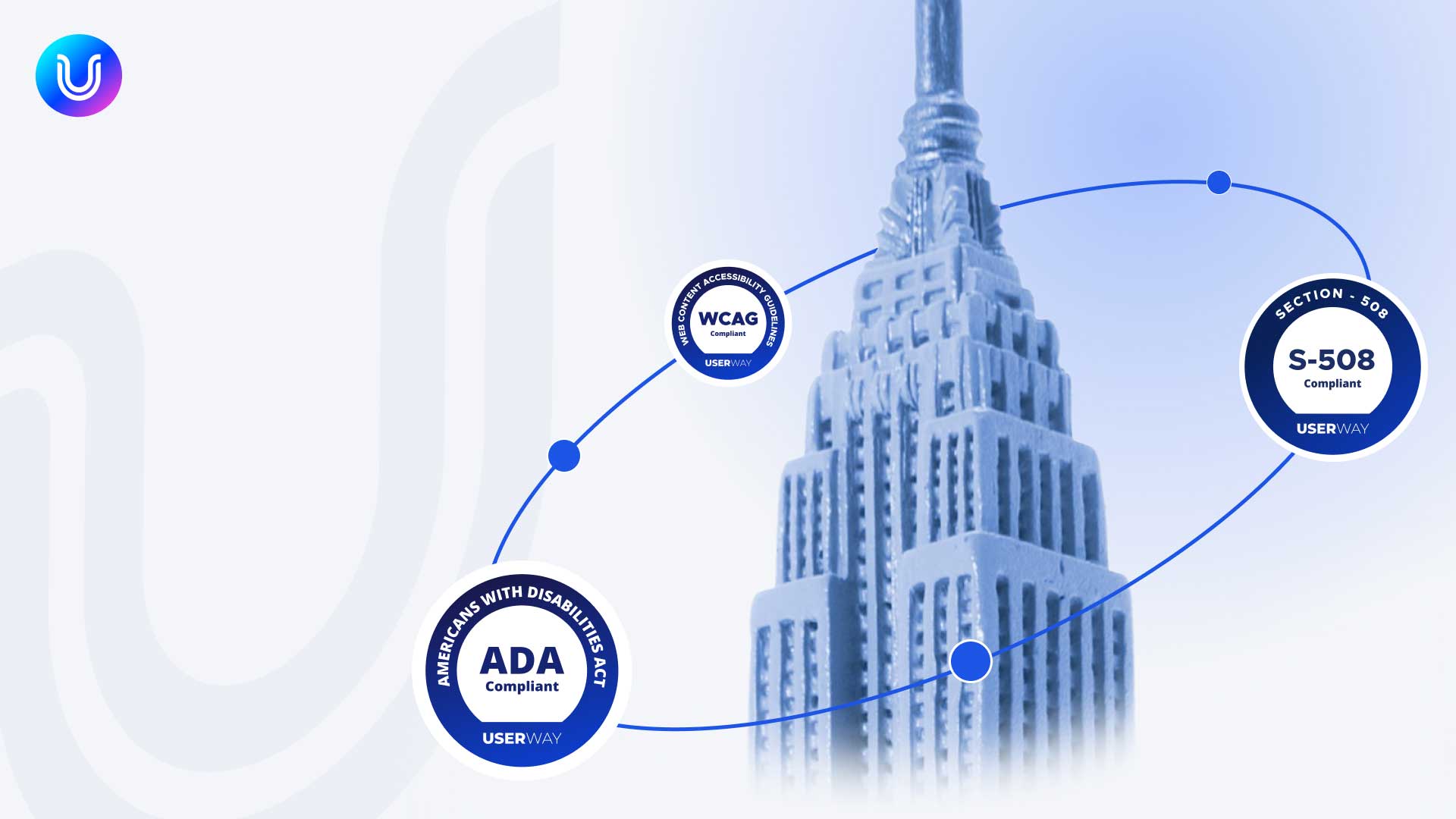New York Executive Law Section 170-F: What You Need to Know

If you’re reading this article, there’s a good chance you’re currently doing business with or considering doing business with the State of New York. If that’s the case, it’s important to understand what’s really behind New York State Executive Law Section 170-F, effective May 31, 2023. The law requires New York State contractors and vendors to make their websites accessible in accordance with the latest digital accessibility guidelines.
The law impacts more than 1,600 contracts in New York State’s centralized contract system, said to be valued at over $40 billion. Centralized state contracts involve public-sector businesses buying products and services from certain private-sector companies. These public-sector businesses include:
- State authorities & agencies
- Transit systems & hospitals
- Local governments & municipalities
- Public & private schools
- Volunteer ambulance & fire companies
- Libraries
- Certain charitable organizations
The private-sector companies include everything from computer retailers to food stores to package delivery services. An example of a centralized state contract could be a school or library, for instance, buying products from an online computer retailer.
According to New York State’s Office of General Services, State contracts encompass a broad spectrum of commodities, services, and technological offerings. Outlined below are the three primary contract categories, accompanied by illustrations of products and services that enterprises offer to public-sector entities:
- Commodity Contracts: cover goods like vehicles and fuel, food and beverages, and office supplies.
- Service Contracts: cover parcel delivery and maintenance of elevators.
- Technology Contracts: cover devices and tools like computers, printing equipment, digital platforms, and telecom.
Now that you know the law is here, let’s jump into how it impacts your business and what you need to do now.
Executive Law Section 170-F: What the Statute Requires
Executive Law Section 170-F mandates New York State contractors and vendors with websites related to or that provide contracted services to comply with the latest Web Content Accessibility Guidelines (WCAG). Here is what the statute says:
Each contractor, subcontractor, vendor, consultant, or other person providing services pursuant to a state contract shall be required to conform any website provided…to the most current version of the Web Content Accessibility Guidelines adopted by the World Wide Web Consortium for accessibility, or any successor standards.
State Technology Law Section 103 Provides Further Guidance on Executive Law Section 170-F
The amended New York State Technology Law Section 103, subdivision 20, complements Executive Law Section 170-F. It requires the state’s Office of Information Technology Services to provide guidance for contractors, subcontractors, vendors, and consultants in their compliance with the WCAG pursuant to Executive Law Section 170-F.
This law went into effect on May 31, 2023, the same day as Executive Law Section 170-F.
So, it is safest to abide by the actual text of this law and conform to WCAG level 2.2.
Assembly Bill 8453 amended the executive and state technology laws by adding Executive Law Section 170-F. Next, we explain how that bill was passed.
The Path from New York Assembly Bill to New York State Law
Assemblymember Jo Anne Simon, [D] introduced New York Assembly Bill 8453 (A08453A) on November 21, 2021. She represents Assembly District 52, which covers several neighborhoods in Brooklyn, including DUMBO, Brooklyn Heights, and Cobble Hill. Simon, who earned a B.A. in Communication Sciences, an M.A. in Education of the Deaf, and a law degree, seeks to improve people’s lives in the disability community. These efforts include working as general counsel for the Association on Higher Education and Disability (AHEAD) and sponsoring the Annual Dyslexia Awareness Day for the past seven years.
The bill sought to amend the executive and technology laws to require state contractors and vendors to comply with the most current version of WCAG. A08543A was co-sponsored by ten other Assembly members from both sides of the aisle. The Memorandum in Support of the Legislation gave the following justification for the bill:
Web accessibility issues are not just an issue for our state’s disabled community[,] many of our state’s senior citizens are also greatly impacted by websites that are not user friendly.
On May 17, 2022, the bill passed the Assembly Floor Vote 146-0 with three abstentions. Subsequently, the bill passed the New York State Senate on June 2, 2022, with a vote of 63-0. These voting results show unanimous bi-partisan support for websites meeting the latest WCAG Guidelines. On December 2, 2022, Governor Kathy Hochul signed the bill into law.
Ultimately, laws should improve society, which is certainly true of laws concerning digital accessibility. The following section reminds us why Executive Law Section 170-F is essential for New York State and the world.
The Critical Importance of Executive Law Section 170-F
Digital accessibility is a global necessity, especially for people with disabilities, who comprise the largest worldwide minority. People everywhere utilize the web for virtually every aspect of their daily routines. People with disabilities are no different. Therefore, laws must support their needs and rights for an equitable online experience.
The New York State Department of Health cites 1 in 5 non-institutionalized adults (3 million New Yorkers) reporting an activity limitation. The 2019 census identified 388,524 New Yorkers with severe vision impairments. These numbers emphasize the sheer magnitude of this population segment and the urgent need to provide digital accessibility.
More WCAG Legislation (Private & Public Sector) on the Horizon
Executive Law Section 170-F is the first state law mandating state contractors and vendors to bring their websites into compliance with WCAG. And because the first state law affecting private business comes out of New York State, known for landmark legislation other states follow, we expect more WCAG state laws that impact the private sector.
Other states, including California, Florida, Illinois, Maryland, Massachusetts, New Jersey, Rhode Island, and Utah, require WCAG compliance in their statutes related to state-agency, voting, and school websites. To that end, references to WCAG in these statutes indicate more public-sector state laws are also forthcoming.
Conclusion
Section 170-F is a critical law for New York State contractors and vendors that makes the web accessible to those with disabilities. In short, digital accessibility is good for society and good for business. Complying with Section 170-F will enable your business to contract with the State of New York.
Moreover, there are obvious legal reasons for meeting compliance, especially with the rise in website accessibility lawsuits. In 2022, over 4,000 organizations were sued due to non-compliance. Complying with Section 170-F’s requirement to make your website accessible will increase protection against legal action.
Learn how UserWay can ensure your website conforms to Executive Law Section 170-F and other critical compliance standards.
UserWay: Unlocking Your Digital Compliance Potential
UserWay’s AI-powered technologies ensure websites conform with ADA, WCAG, and other online-related laws. By meeting WCAG requirements, state contractors and vendors can comply with Section 170-F requirements. Discover how UserWay’s solutions and services can ensure your website conforms to this new New York State website accessibility law and other accessibility standards.
Contact UserWay to consult with a digital accessibility expert.
Common FAQs
When did Section 170-F Take Effect?
The law took effect on May 31, 2023.
What’s the Best Way to Conform to Section 170-F?
State contractors and vendors should have their websites meet the latest WCAG requirements by May 31, 2023. The current version of WCAG is 2.2 and was recently published in October 2023. Meeting these requirements will help you comply with New York state law and WCAG, the international guidelines for digital accessibility.
What are the Legal Risks of Non-Compliance?
Those thinking about contracting with the state will likely need an accessible website to enter into the procurement process or remain a contractor or vendor. There is no direct enforcement requirement under Section 170-F for current state contractors and vendors. However, the legislative history suggests that claims pursuant to this statute may be made to the New York State Division of Human Rights or other regulators.
Generally speaking, all New York businesses should make their websites accessible. New York is the country’s hotbed for website accessibility lawsuits brought under The Americans with Disabilities Act (ADA). These lawsuits also frequently assert claims under New York State Human Rights Law and New York City Human Rights Law. Whether it’s federal, state, or local law, all these lawsuits claim a failure to comply with WCAG.




Share